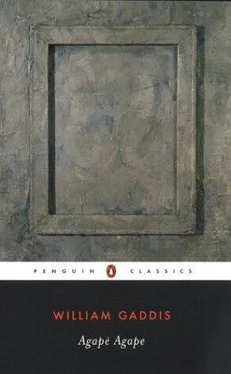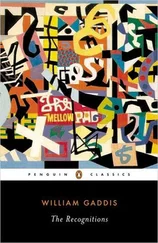The near superimposition of fictional identity upon the real intensifies the immediacy of the voice — its hold-you-fast-by-the-shirtfront quality — even as it has us hunting for correlations with what we know, or can easily find out, about the author. Primarily, of course, there is the fact that he was himself dying of cancer as he wrote his dying narrator. (Gaddis died in 1998, soon after finishing Agapē Agape.) But the few autobiographical references we get further confirm a near-identification of author and narrator. Among these, the most salient is the narrator’s long-standing obsession with the history of the player piano that he has been writing. Gaddis himself had just such a project underway for many years, as the excerpts gathered in his posthumous collection of pieces, The Rush for Second Place, attest. What’s more, the writing of just such a history occupies his character Jack Gibbs in JR, which should alert us to the fact that the author long made free with the materials of his own experience in his fiction.
Gaddis all along had more in mind, however, than just documenting a particular interlude in the history of applied mechanization. The player piano was for him a significantly symbolic development and its history illuminated a great deal about the growth of binary thinking and what he saw as the epochal shift from artistic to entertainment values. In this way it lends itself perfectly to his several linked larger investigations, including the questioning of the authenticity and authority of artistic work (The Recognitions) and the warping force of capitalism (JR), especially in the cultural arena. His views often recall those expressed by Walter Benjamin in his great essay, “The Work of Art in the Age of Mechanical Reproduction,” which weighed the loss of “aura”—the immediacy of the unique work of art — against the proclaimed gains of a democratic dissemination of reproductions.
But of course Walter Benjamin got there first. Moreover, Benjamin mounted a sustained argument, whereas Gaddis’ treatment, either via Jack Gibbs, in his voluminous notes, or in his protagonist’s drug-inflected musings in Agapē Agape, was impressionistic at best. He used his research to make what is finally an emotional argument about the decline of culture, the compromise of quality and uniqueness by lock-step standardization and the popular ethos of relativism. Still, the serious intellectual grounding is there and his critique lends considerable power to this transcription of a dying man’s outcry.
Gaddis begins: “No but you see I’ve got to explain all this because I don’t, we don’t know how much time there is left and I have to work on the, to finish this work of mine while I, why I’ve brought in this whole pile of books notes pages clippings and God knows what, get it all sorted and organized when I get this property divided up and the business and worries that go with it while they keep me here to be cut up and scraped.” And from here the prose pushes on, without pauses or rests, gathering and losing momentum as the narrator’s thought-fugue plays itself out.
The writing plunges us straightaway into the distressed mind-state of a dying man. It is, on that level, mimetic. It is also complexly calculated. Aside from the obvious debt to the stream-of-consciousness strains of modernism (James Joyce and Virginia Woolf), we can point to the click-and-rewind line disruptions of Samuel Beckett, most obviously in Krapp’s Last Tape, and the staggered syncopations of the player piano itself, or of Glenn Gould (invoked admiringly in these pages) imposing his peculiar discipline on the idea of the melodic. But the true root influence remains Bernhard’s disturbing novel Concrete, and Gaddis’ incorporation of the Austrian master deserves our attention, not least because in the process of invoking him he more or less offers us a cross section view of both his procedure and his themes.
The key passage comes early in the book. The narrator — he is in the hospital — has already begun to inveigh against the proliferation of the player piano: “. . it was the plague,” he states, “spreading across America a hundred years ago with its punched paper roll at the heart of the whole thing, of the frenzy of invention and mechanization and democracy and how to have art without the artist and automation, cybernetics, you can see where the damn!” The exclamation does not signal the end of the thought by any means. It merely marks a shift of focus — the narrator has suddenly discovered that he is bleeding. By this point we are already schooled in the jerky disruptions of the style, how they signal abrupt swerves of consciousness. We tune in as he resumes, almost detached: “. . blood all over the place it doesn’t hurt no, skin’s like parchment that’s the prednisone, turns the skin into dry old parchment tear it open with a feather that’s the prednisone, reach for a book reach for anything tear myself to pieces reaching for this book listen, you’ll see what I mean, opening page you’ll see what I mean,” whereupon — and now we must pay very close attention — he shifts again, this time moving directly into the translated prose of Bernhard. The narrator now enfolds the opening sentence of Concrete — never directly identified as such — into his own thought, connecting Bernhard’s words directly to the preceding, as follows: “‘From March to December,’ he says, ‘while I was having to take large quantities of prednisolone,’ same thing as prednisone, ‘I assembled every possible book and article written by’ you see what I mean? ‘and visited every possible and impossible and impossible library’ this whole pile of books and papers here? ‘preparing myself with the most passionate seriousness for the task, which I had been dreading throughout the preceding winter, of writing’. .”
Gaddis has never been what we could call “reader-friendly.” Indeed, if his own staggering, impacted style were not enough, he must tax us further with the stitched in phrases of another equally disjunctive, headlong stylist. His homage. But then, a few sentences farther on, he exclaims: “It’s my opening page, he’s plagiarized my work right here in front of me before I’ve even written it!” (p. 12). What a wonderful, addled, utterly appropriate move, to fuse paranoia and idolatry into a preemptive reversal, the borrower accusing the originator of taking his words before he’s written them. It wouldn’t stand up in a court of law, but damn the logic — it’s the fondest soldering of sensibilities that happens here, or, to vary the metaphor, a kind of literary author-pophagy. And the point of the alliance? To me it betokens a strategy of acceleration and intensification. If a poet wants to offer a lyric memorial, she reaches for the elegy form. Just so, when Gaddis, a novelist, would speak from the edge of extinction, he seizes on a precedent. And not just any precedent — after all, he could have used Hermann Broch’s The Death of Virgil, Marguerite Yourcenar’s Hadrian’s Memoirs, Carlos Fuentes’ The Death of Artemio Cruz, and doubtless many others — but that of Bernhard, the fierce, enraged, principled, scornful, headlong denouncer of Western decline, the author who can scarcely speak for the contending pressure of his many vituperations.
Yes, Gaddis’ dying protagonist is enraged, and as he says himself: “all writing worth reading comes, like suicide, from outrage or revenge” (p. 63). It is a pronouncement we may not entirely endorse, but in this context we do paid heed, for Gaddis’ novel is fueled on many levels by the darker emotions. Primarily, of course, Agapē Agape is a lacerating cry against bodily pain and death — the man is actively suffering. And his suffering puts the edge on the big questions, the old questions. In the absence of plot, they are what survives. What has my life been? What is in store? What is the point of our strife and toiling — the very questions raised by Tolstoy (who is invoked often in these pages) in The Death of Ivan Ilych and elsewhere. And so we find the author interrogating everything, blasting corruption and cowardice, inveighing against bodily dissolution with one breath and the timorous-ness of literary prize committees with the next.
Читать дальше












